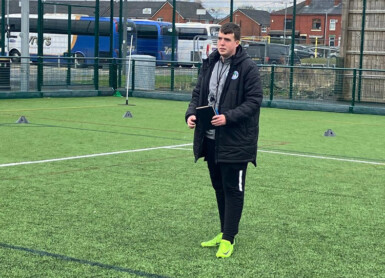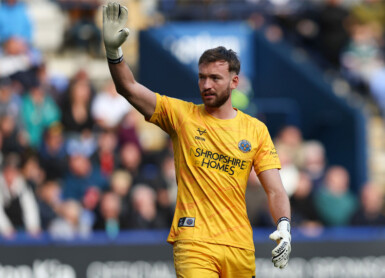A century on from the Great War of 1914-18, football united to offer its own tributes to those that fought and died for their country in the conflict.
On a bone chilling day in northern France, the Football League’s Andy Williamson, Greg Dyke of the Football Association, Gordon Taylor of the Professional Footballers’ Association, Richard Bevan of the League Managers Association and Mike Foster of the Premier League, gathered to pay their respects. Football was unified.
The trip organised by the Football League was part of series of centenary commemorations of the game’s role in the war. Initially criticised for playing on while war raged, the national sport reacted by forming the so-called Footballers Battalions, made up of players, officials, referees, fans and others from across the game.
A particularly poignant moment came when the party moved from the Lochnagar Crater, to the Gordon Dump Cemetery where the grave of Donald Bell, the only professional footballer ever to be awarded the Victoria Cross is located amongst thousands of others.
Bell, the first professional footballer to volunteer for service in the Great War, was 25 when he wrote to his mother in July, 1916, from the Somme to tell her about his ‘biggest fluke’.
Under heavy enemy bombardment he managed to approach a German trench, destroy a machine-gun emplacement that had been mowing down British troops and took out dozens of enemy soldiers.
As a footballer at Crystal Palace, Newcastle and later with Bradford Park Avenue, Bell’s speed had been honed – his ability to run 100 yards in 10.6 seconds, a reflection of his primary asset.
“I must confess it was the biggest fluke alive and I did nothing. I only chucked one bomb but it did the trick,” he wrote.
“The Company Commander says I saved the situation for this gun was doing all the damage. He told me that I was to be recommended so there is a chance of me getting a Military Cross or something.
“We are out of the trenches at present and I am perfectly fit. The only thing is I am sore at elbows and knees with crawling over limestone flints. I believe that God is watching over me and it rests with him whether I pull through or not.”
He didn’t. While Bell’s actions, on July 5 that year, earned him a Victoria Cross and a citation for a ‘very brave act (that) saved many lives’ he was dead 5 days later. Killed by a shot to his head that pierced through his helmet as though it was a flimsy tin can.
So it was with astonishment when almost 100 years after Bell earned it, the soldier and his medal were brought together for the first time.
“It was an emotional moment to see the medal at the grave when you think about how it was earned,” said LFE’s Alan Sykes, who was also part of the football delegation to make the trip.
“Heroism and bravery are words that are used with such regularity that you can sometimes forget what they actually mean. When you think about the sacrifice of those that fought and died in often quite barbaric conditions it puts things into perspective.”
Speaking to the Mail on Sunday FA chairman, Greg Dyke, said:
“On that first day of the Somme alone, the number either killed or injured was equivalent to everybody at Old Trafford. That’s unbelievable – the scale of it.”
Taylor who sanctioned the £210,000 purchase of Bell’s VC by the PFA, so that it could be displayed permanently at the National Football Museum in Manchester, fittingly donned white gloves to drape the medal over Bell’s gravestone:
“He wrote home to say he was just lucky but Bell was a gentle man of duty and honour,” Taylor said.
“We hope that what was in the genes of those heroes’ remains in the genes of sports men and women today. Football still has an ability to bring communities together.”




